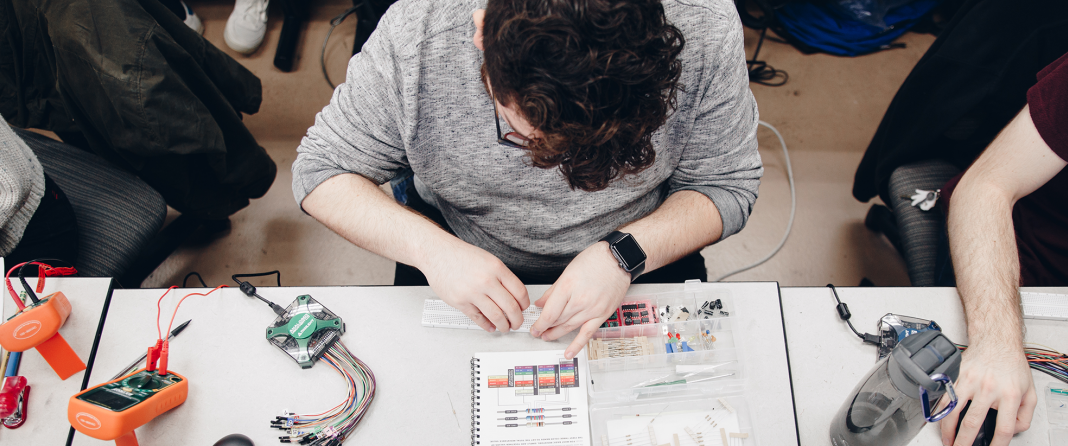Overview
The engineering field continues to grow, with electrical and computer engineering in particular projected to add about 25,000 jobs per year to the market. Our bachelor’s program in electrical and computer engineering will prepare today’s students to take advantage of that growth.
Through a combination of engineering, science, and mathematics courses, you’ll gain a strong theoretical foundation while learning to take that knowledge and creatively apply it. You’ll design and conduct experiments; interpret and analyze data; design systems to meet needs within economic, environmental, social, political, ethical, health and safety, manufacturability and sustainability constraints; and identify and solve engineering problems. And it’s all paired with the ability to apply Christian principles to ethical and moral issues related to engineering.
At Trevecca, you’ll have 24/7 access to labs and caring professors who feel called to pour their lives into tomorrow’s leaders. Our professors bring real-world experience to the classroom, and our student-to-faculty ratio means you’ll work closely with professors who know first-hand what it takes to succeed in your chosen field.
Faculty
News
Core Classes
Financial Aid
Outcomes / Careers
Upon graduation, you’ll be prepared to enter an exciting, rapidly growing field. Computer and electrical engineering jobs are expected to experience significant growth over the next eight years.
Entry-level computer engineering jobs include electrical controls designer, big data software engineer, cyber risk splunk specialist, cyber risk vigilant splunk specialist, systems engineer, software engineer, cybersecurity & privacy - penetration testing associate, artificial intelligence engineer, desktop/client support associate, machine learning engineer and more.
Entry-level electrical engineering jobs include electrical engineer, automation engineer, technical services engineer, process control leader, project engineer, IT developer, pneumatic controls technician, electrical distribution engineer, controls designer, electrical maintenance technician, solar PV designer, powertrain systems engineer, research engineer, office engineer and more.
FAQs
About the Program
Is there an application fee?
No, it’s free to apply!
What will I learn and gain from the program?
Graduates of the program will walk away with:
-an ability to apply knowledge of mathematics, science and engineering
-an ability to design and conduct experiments, as well as to analyze and interpret data
-an ability to design a system, component, or process to meet desired needs within realistic constraints such as economic, environmental, social, political, ethical, health and safety, manufacturability and sustainability
-an ability to function on multidisciplinary teams
-an ability to identify, formulate, and solve engineering problems
-an understanding of professional and ethical responsibility
-an ability to communicate effectively
-the broad education necessary to understand the impact of engineering solutions in a global, economic, environmental and societal context
-a recognition of the need for, and an ability to engage in life-long learning
-a knowledge of contemporary issues
-an ability to use the techniques, skills and modern engineering tools necessary for engineering practice.
-an ability to apply Christian principles to ethical and moral issues related to their major.
About Future Careers
What kind of work can I do with a degree in computer or electrical engineering?
There are numerous career opportunities with a degree in computer or electrical engineering. Here are a few great career possibilities: electrical controls designer, software engineer, systems engineer, artificial intelligence engineer, machine learning engineer, electrical engineer, automation engineer, technical services engineer, project engineer, IT developer, electrical distribution engineer, controls designer, powertrain systems engineer, research engineer, office engineer and more.
What can I earn with a career in engineering?
The Bureau of Labor Statistics’ Career Outlook Handbook reported that, in 2017, the median pay for computer hardware engineers was approximately $115,000. It also reported that the median pay for electrical engineers was approximately $98,000.
Is engineering a satisfying career?
A survey of over 700 engineers conducted by Experis in January 2017 revealed that 96% of the engineers surveyed are satisfied with their profession, and they intend to remain in the field of engineering for the duration of their career (97%). Ninety-five percent of those engineers are likely to recommend engineering as a career to others.
Overview
The engineering field continues to grow, with electrical and computer engineering in particular projected to add about 25,000 jobs per year to the market. Our bachelor’s program in electrical and computer engineering will prepare today’s students to take advantage of that growth.
Through a combination of engineering, science, and mathematics courses, you’ll gain a strong theoretical foundation while learning to take that knowledge and creatively apply it. You’ll design and conduct experiments; interpret and analyze data; design systems to meet needs within economic, environmental, social, political, ethical, health and safety, manufacturability and sustainability constraints; and identify and solve engineering problems. And it’s all paired with the ability to apply Christian principles to ethical and moral issues related to engineering.
At Trevecca, you’ll have 24/7 access to labs and caring professors who feel called to pour their lives into tomorrow’s leaders. Our professors bring real-world experience to the classroom, and our student-to-faculty ratio means you’ll work closely with professors who know first-hand what it takes to succeed in your chosen field.

